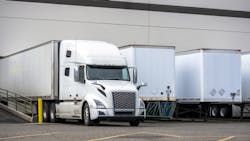As we reflect on the first part of the year and assess the near-term future of the trucking industry, the supply chain remains at the top of our minds. At a recent NationaLease maintenance managers’ meeting, Rob Garcia, senior vice president of supply management, and Sean Storey, vice president of capital equipment, shared their thoughts on the state of trucking with attendees.
Garcia and Storey believe supply chain issues leading to product and component shortages will continue for some time with no end in sight. Their views are supported by findings from NTT Data’s 2022 Third-Party Logistics (3PL) Study, which focuses on the current state of the 3PL market; environmental, social, and governance (ESG) issues; an intelligent supply chain; the cold chain; and revisiting the effects of COVID-19.
See also: Analysts forecast possible recession in CV outlook
According to the study, more than two-thirds (68%) of shippers believe that supply chains have become too global and must be rebalanced toward more regional and local/domestic ecosystems within larger global enterprises.
There is some good news for the trucking industry: Both Garcia and Storey believe the increased use of technology will provide more market intelligence and encourage supply chain agility.
In the meantime, fleets can take these actions to help navigate the continued supply chain challenges:
- Since it is unclear whether fleets will receive all the new trucks needed, assess the health of existing assets and alter preventive maintenance schedules as necessary to ensure equipment is in top operating condition.
- Determine how price increases can be passed along and share the reasons for the increase with customers.
- Establish relationships with a diverse group of suppliers—ideally sourcing from different global regions—for all your core products.
- Communicate often with your OEM about what your needs are for 2023. Be specific about the model, spec, and desired delivery timeline for new trucks.
See also: The right information leads to better inventory management
As the trucking industry continues to be affected by ongoing supply chain issues, employing these actions can help lessen the impact on your operations and help prepare for a stronger future.
Jane Clark focuses on managing the member services operation at NationaLease as vice president of member services. She works to strengthen member relationships, reduce member costs, and improve collaboration within the NationaLease supporting groups.
About the Author
Jane Clark
Senior VP of Operations
Jane Clark is the senior vice president of operations for NationaLease. Prior to joining NationaLease, Jane served as the area vice president for Randstad, one of the nation’s largest recruitment agencies, and before that, she served in management posts with QPS Companies, Pro Staff, and Manpower, Inc.
